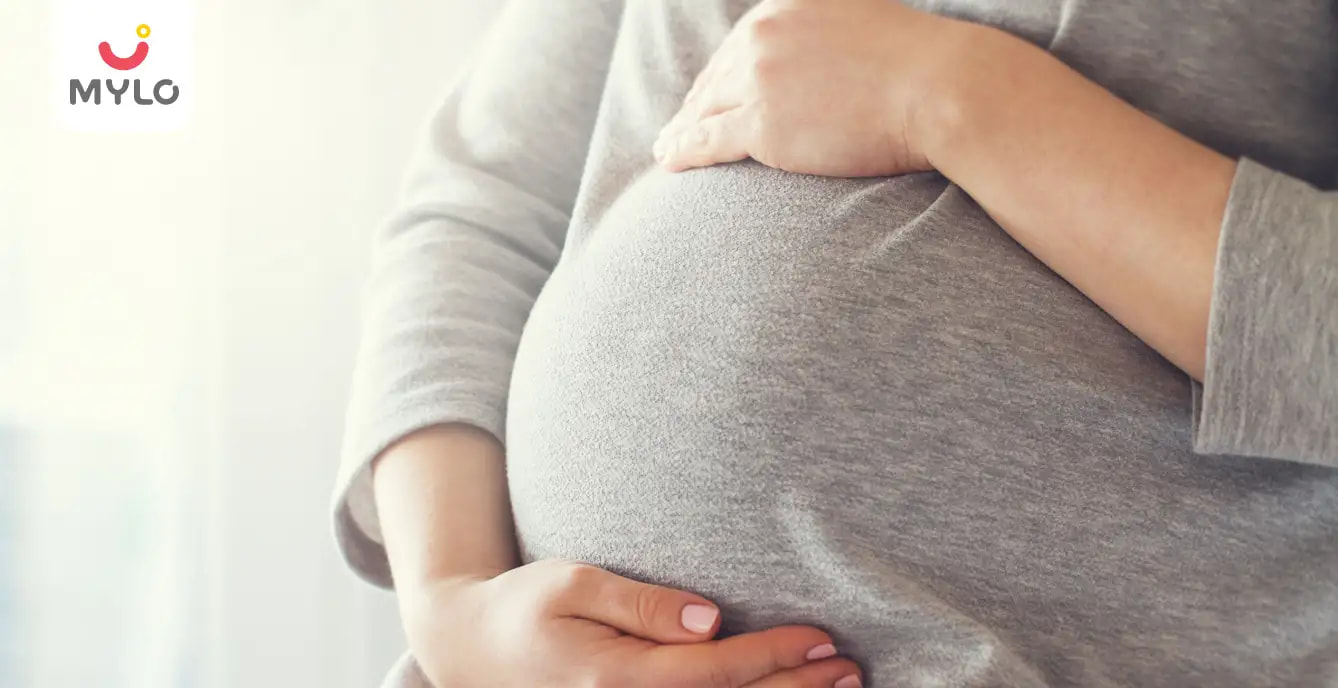Home

Umbilical Hernia in Pregnancy - Causes, Symptoms & Treatment
In this Article

Pregnancy
Umbilical Hernia in Pregnancy - Causes, Symptoms & Treatment
Updated on 3 November 2023
For pregnant women, learning the potential causes and signs of umbilical hernia can be critical for staying safe and healthy. Learn about the causes, symptoms, and treatment options for this condition which is surprisingly more common in pregnancy than you might think.
What is umbilical hernia?
An umbilical hernia is a condition that can occur during pregnancy when the baby’s umbilical cord protrudes through the mother’s abdominal wall. This may cause the mother to experience pain and discomfort, as well as an increase in the size of her belly button. In some cases, the umbilical hernia may resolve itself after delivery, but in other cases, surgery may be required to repair the hernia.
What Causes an Umbilical Hernia in Pregnancy?
Umbilical hernias are common during pregnancy, occurring in up to 10% of pregnant women. They are caused by the increased pressure on the abdominal wall from the growing baby. The extra pressure can cause the abdominal muscles to separate, allowing a portion of the intestines to protrude through the opening. Umbilical hernias are mostly harmless and do not cause any pain or discomfort.
Umbilical Hernia Pregnancy Symptoms
These hernias are most common in infants, but they can also occur in adults. In pregnant women, umbilical hernias can cause several symptoms, including:
-
A bulge or swelling around the belly button
-
Pain or discomfort when lifting, coughing, or straining
-
A feeling of heaviness or pressure in the abdomen
If you experience any of these symptoms, it is important to see your doctor so that the hernia can be properly diagnosed and treated.
What an umbilical hernia does to you and your baby?
An umbilical hernia is usually benign and asymptomatic but can cause pain and/or difficulty with bowel movements.
Umbilical hernias can get stuck and cannot be pushed back into the abdomen. This can cause severe pain and likely lead to tissue death. If you have an umbilical hernia, it is important to see a doctor so that they can monitor it for these risks.
There are chances that an umbilical hernia may worsen during pregnancy as the uterus grows. This can put pressure on the abdominal wall and cause the hernia to protrude more. In some cases, surgery may be required to repair the hernia before or after delivery.
If you have an umbilical hernia, you will likely need to see a doctor for regular check-ups. They will monitor the size of the hernia and assess whether or not it is becoming incarcerated or strangulated. If you experience pain or other symptoms, please see a doctor right away, as this may be a sign of a serious condition.
Treatment of an umbilical hernia in pregnancy
These hernias are common and usually harmless during pregnancy. However, they can sometimes cause pain or discomfort. If this is the case, there are several treatment options available.
The first step is to try to reduce the amount of strain on your abdominal muscles. This can be done by wearing supportive clothing such as a pregnancy girdle. You may also need to modify your activities and avoid lifting heavy objects.
If these measures don't relieve your symptoms, your doctor may advise surgery to repair the hernia. This is usually done after the baby is born. In some cases, the hernia can be repaired during pregnancy, but this is usually only necessary if the hernia is large or causes severe pain.
Recovery after treatment
Recovery after treatment for umbilical hernia in pregnancy is mostly quick and easy. In most cases, the hernia will heal on its own within a few weeks to months. However, if the hernia is large or does not heal on its own, surgery may be required to close the hole in the abdominal wall. Surgery is performed as an outpatient procedure, meaning you can go home the same day. Recovery from surgery takes about four to six weeks. During this time, you will need to avoid strenuous activity and lift anything heavy.
Preventing an umbilical hernia
Several measures can be taken to help prevent an umbilical hernia during pregnancy:
1. Avoid gaining too much weight:
Excess weight gain can put extra pressure on the abdominal muscles and increase the risk of developing a hernia.
2. Eat a healthy diet:
A nutritious diet will help keep the muscles strong and prevent obesity, which can lead to a hernia.
3. Exercise regularly:u
Regular exercise helps tone abdominal muscles and reduces the risk of developing a hernia.
4. Avoid straining during bowel movements:
Straining can put extra pressure on the abdominal muscles and lead to a hernia.



Written by
Loveleen Gupta
A working mother with more than two decades of experience in writing for the publishing industry and digital space, Loveleen Gupta loves dabbling in creative writing also. A graduate from Miranda House, she uses her personal experiences to express herself.
Read MoreGet baby's diet chart, and growth tips

Related Articles
Related Questions
Influenza and boostrix injection kisiko laga hai kya 8 month pregnancy me and q lagta hai ye plz reply me

Hai.... My last period was in feb 24. I tested in 40 th day morning 3:30 .. That is faint line .. I conculed mylo thz app also.... And I asked tha dr wait for 3 to 5 days ... Im also waiting ... Then I test today 4:15 test is sooooo faint ... And I feel in ma body no pregnancy symptoms. What can I do .

Baby kicks KB Marta hai Plz tell mi

PCOD kya hota hai

How to detect pcos

RECENTLY PUBLISHED ARTICLES
our most recent articles

Diet & Nutrition
গর্ভাবস্থায় আলুবোখরা: উপকারিতা ও ঝুঁকি | Prunes During Pregnancy: Benefits & Risks in Bengali

Diet & Nutrition
গর্ভাবস্থায় হিং | ঝুঁকি, সুবিধা এবং অন্যান্য চিকিৎসা | Hing During Pregnancy | Risks, Benefits & Other Treatments in Bengali

Women Specific Issues
স্তনের উপর সাদা দাগ: লক্ষণ, কারণ এবং চিকিৎসা | White Spots on Nipple: Causes, Symptoms, and Treatments in Bengali

Diet & Nutrition
গর্ভাবস্থায় পোহা: উপকারিতা, ধরণ এবং রেসিপি | Poha During Pregnancy: Benefits, Types & Recipes in Bengali

Diet & Nutrition
গর্ভাবস্থায় মাছ: উপকারিতা এবং ঝুঁকি | Fish In Pregnancy: Benefits and Risks in Bengali

Diet & Nutrition
গর্ভাবস্থায় রেড ওয়াইন: পার্শ্ব প্রতিক্রিয়া এবং নির্দেশিকা | Red Wine During Pregnancy: Side Effects & Guidelines in Bengali
- ইনার থাই চ্যাফিং: কারণ, উপসর্গ এবং চিকিৎসা | Inner Thigh Chafing: Causes, Symptoms & Treatment in Bengali
- গর্ভাবস্থায় ব্রাউন রাইস: উপকারিতা ও সতর্কতা | Brown Rice During Pregnancy: Benefits & Precautions in Bengali
- Velamentous Cord Insertion - Precautions, Results & Safety
- Unlock the Secret to Flawless Skin: 7 Must-Have Qualities in a Face Serum
- Unlock the Secret to Radiant Skin: How Vitamin C Serum Can Transform Your Complexion
- Gender No Bar: 10 Reasons Why Everyone Needs a Body Lotion
- Unlock the Secret to Radiant Skin How to Choose the Perfect Body Lotion for Your Skin Type
- Top 10 Reasons to Apply a Body Lotion After Every Bath
- Communication in Toddlers: Milestones & Activities
- How to Improve Vocabulary for Toddlers?
- A Comprehensive Guide to Understanding Placenta Accreta
- Vulvovaginitis in Toddlers Causes, Symptoms and Treatment
- A Comprehensive Guide to Understanding Cerebral Palsy in Children
- Bitter Taste in Mouth During Pregnancy: Understanding the Causes and Remedies


AWARDS AND RECOGNITION

Mylo wins Forbes D2C Disruptor award

Mylo wins The Economic Times Promising Brands 2022
AS SEEN IN
















- Mylo Care: Effective and science-backed personal care and wellness solutions for a joyful you.
- Mylo Baby: Science-backed, gentle and effective personal care & hygiene range for your little one.
- Mylo Community: Trusted and empathetic community of 10mn+ parents and experts.
Product Categories
baby carrier | baby soap | baby wipes | stretch marks cream | baby cream | baby shampoo | baby massage oil | baby hair oil | stretch marks oil | baby body wash | baby powder | baby lotion | diaper rash cream | newborn diapers | teether | baby kajal | baby diapers | cloth diapers |




